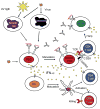The innate immune system in SLE: type I interferons and dendritic cells
- PMID: 18490415
- PMCID: PMC3694565
- DOI: 10.1177/0961203308090020
The innate immune system in SLE: type I interferons and dendritic cells
Abstract
Patients with systemic lupus erythematosus (SLE) have an increased expression of type I interferon (IFN) regulated genes because of a continuous production of IFN-alpha. The cellular and molecular background to this IFN-alpha production has started to be elucidated during the last years, as well as the consequences for the innate and adaptive immune systems. Plasmacytoid dendritic cells (pDC) activated by immune complexes containing nucleic acids secrete type I IFN in SLE. Type I IFN causes differentiation of monocytes to myeloid-derived dendritic cell (mDC) and activation of autoreactive T and B cells. A new therapeutic option in patients with SLE is, therefore, inhibition of IFN-alpha, and recent data from a phase I clinical trial suggests that administration of neutralizing monoclonal antibodies against anti-IFN-alpha can ameliorate disease activity.
Figures

References
-
- Hardy MP, Owczarek CM, Jermiin LS, Ejdeback M, Hertzog PJ. Characterization of the type I interferon locus and identification of novel genes. Genomics. 2004;84:331–345. - PubMed
-
- Akira SS, Uematsu S, Takeuchi O. Pathogen recognition and innate immunity. Cell. 2006;124:783–801. - PubMed
-
- Takaoka A, Wang Z, Choi MK, et al. DAI (DLM-1/ZBP1) is a cytosolic DNA sensor and an activator of innate immune response. Nature. 2007;448:501–505. - PubMed
-
- Siegal FP, Kadowaki N, Shodell M, et al. The nature of the principal type 1 interferon-producing cells in human blood. Science. 1999;284:1835–1837. - PubMed
Publication types
MeSH terms
Substances
Grants and funding
LinkOut - more resources
Full Text Sources
Medical

